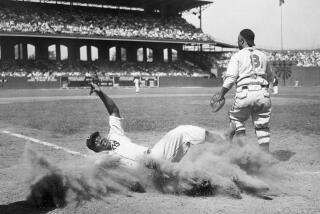What Would Ty Cobb Be Worth in Today’s Player Market? Don’t Ask
- Share via
SCOTTSDALE, Ariz. — Ty Cobb collected more than base hits and stolen bases during his lifetime. He also made a lot of money.
A fierce and intelligent player, Cobb showed the same qualities in business. He waged salary battles with the club, invested his money shrewdly and made a fortune.
Cobb, born 100 years ago this year, would be an expensive player in today’s market. By winning the American League batting title nearly every year, which he did, he would rival and surpass the situation enjoyed by Boston Red Sox star Wade Boggs.
Things wouldn’t be quite that simple, though. Driven to be the best at anything he did, Cobb might have viewed arbitration and free agency as still another forum in which to compete.
What follows is a guess at what Cobb--measured against the performances of his era--could have commanded in the salary structures of the late 1970s and early 80s. He could have been the first $3 million man.
Cobb was supreme at the things that counted most in his time--hitting, bunting, base-stealing, fielding. His relatively few home runs would not have been a problem in negotiations. Homers were not yet the style of the day.
Cobb joined the Detroit Tigers in 1905 and hit .240, nothing exceptional. But it was good enough to earn him another shot. That would mean a raise over the minimum rookie salary.
By 1906, Cobb began to show some signs of greatness. He hit .320, a huge improvement over the previous year. At the end of this season, he would have become eligible for arbitration. It’s possible that Cobb, very strongly individual, would have argued his own case. One thing seems likely. If an agent argued Cobb’s case and lost, he wouldn’t have kept his job long.
Cobb again would have been eligible for arbitration in 1907, and by then he had enough stats to make an impressive case. He led the league with a .350 average, a .473 slugging percentage, 49 stolen bases, 212 hits, and 116 RBIs.
He had established himself as one of the dominant players in the league. Keep in mind that Boggs won $1 million in arbitration after the 1984 season--with less impressive statistics.
Cobb’s dominance continued in 1908, when he hit .324 for his second straight batting title. He also led the American League with a .475 slugging percentage, 188 hits, 36 doubles, 20 triples 20 and 108 RBIs.
By this time, Cobb would have created an interesting dilemma for the Tigers. He had played four years, topped .300 three times, and won two batting titles. It would have been time for the club to decide whether to sign him to a longterm contract or risk arbitration every year.
As things turned out, the Tigers would have been wise to offer a long deal. In 1909, Cobb enjoyed his first truly spectacular year, winning his third straight batting title with a .377 average, a .517 slugging percentage, 76 stolen bases, 216 hits, 116 runs, and 107 RBIs.
The performance would have been enough to force the Tigers into some quick thinking. Should they finally sign him to that multi-year contract, or risk losing him to free agency?
Cobb was at the top of his profession. He had won three straight batting titles, with no sign of slowing. He was also entering his option year, after which he would have become eligible to go on the open market.
In 1910, the year that would have been his option year, Cobb hit .385 to capture his fourth straight title. He was the superstar of the day.
Think about it. During the days when the Yankees were trying to sign Dave Winfield, how much would Cobb have commanded on the market? Consider also the fact that Cobb helped take the Tigers to the World Series in 1907, 1908, and 1909. How much would a team pay a perennial batting champion? A perennial batting champion who had played in three World Series?
Not even Reggie Jackson offered that combination of success and consistent dominance.
The players’ association might prefer to view things this way: would major league owners have been able to resist bidding on Cobb, the way they did with Kirk Gibson this past winter?
One thing is for sure: If Cobb had lived at the height of free agency, he would have needed no investments to grow rich.
More to Read
Go beyond the scoreboard
Get the latest on L.A.'s teams in the daily Sports Report newsletter.
You may occasionally receive promotional content from the Los Angeles Times.









